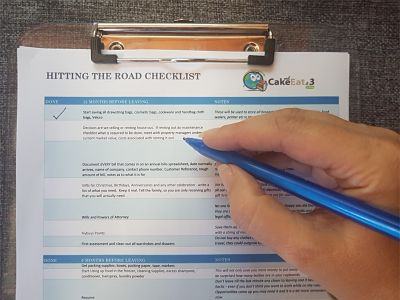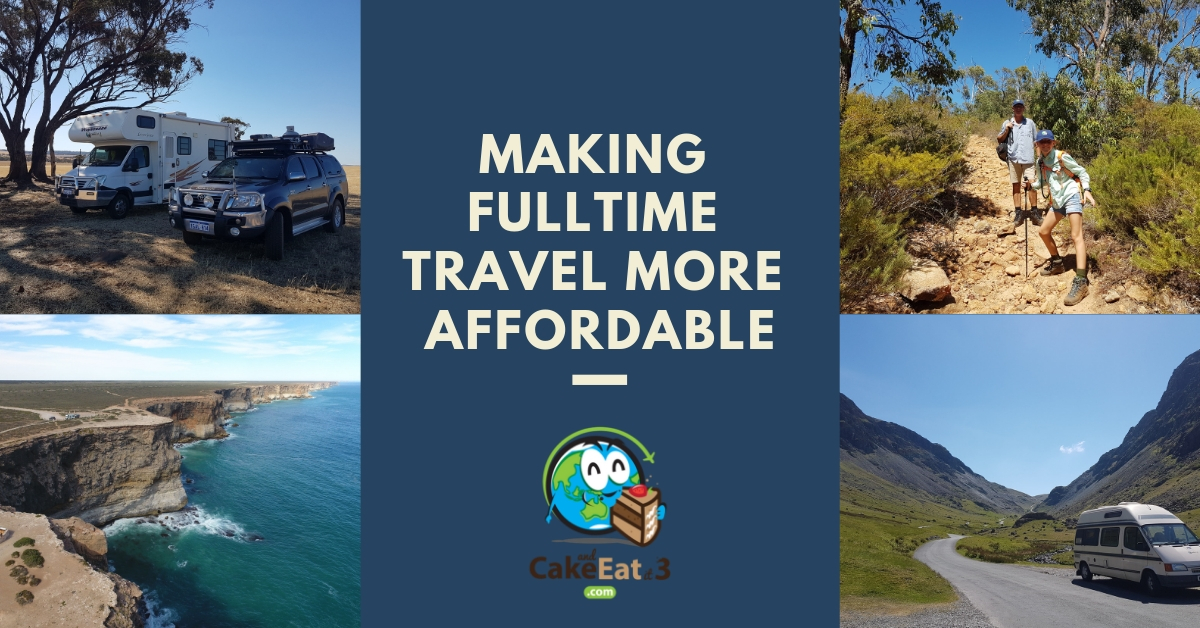One of the main questions we get asked is, ‘What is your ‘weekly budget?’ or ‘How do you afford fulltime travel?’ Every person you ask, the answer will be different. There are ways of making fulltime travel more affordable, let’s explore them.
Our aim is, that this post and our experiences will help you. There are so many things you can do before leaving for fulltime travel, that will help you enjoy your time on the road.
Prefer youtube video, Cake and Eat it 3 walk you through it here.
Checklist

OK, so anyone who has followed us for a while knows we are list makers.
We have packed up and took off a number of times and have a bit of experience with this. So, we wrote a checklist for those that may be hitting the road fulltime, for the first time. Checklist here.
Reduce debt
Pretty obvious, but so important. Delay if need be. It will be worth it. While you have a steady income stream this is the time to pay off as much debt, especially bad debt (credit cards, store credit, hire purchase loans, any non income producing loans).
If you don’t have any – Great Job! To understand the difference between good debt vs bad debt click here.
Budget
Although checking what other people spend can be helpful, there are so many variables that honestly, only you can work out what will work for your family. Something as simple as
that honestly, only you can work out what will work for your family. Something as simple as
Do they drink alcohol can dramatically change a budget.
Do they eat out? You get the idea.
Start writing down everything you buy and see how much you are spending. A big help is the 12 month prior Bills list I mention in the above checklist. Where can you save or cut costs already.
Buffer

You can plan and prepare to your hearts content.
Shit happens.
Before leaving put away whatever you can afford in a buffer account, so when shit hits the fan, your ready.
Know your faults if you are not good at saving, don’t keep this money in your every day savings account. It is a buffer – a get out of shit free card. Car problems, unexpected bills, emergency dental visits, the list goes on.
Not only will you feel better that you know it’s there. In the event you need it, you are not stopping somewhere you would rather not be, getting a job you would rather not be doing, to find money.
For those of you retaining your properties we recommend a buffer for each property you own too to allow for rental vacancies, maintenance, water leaks you know the drill.
Vehicle for making fulltime travel more affordable
What vehicle you are taking can dramatically effect the costs while fulltime travelling. Also its reliability. now any vehicle you buy (I am not going to get into which one is THE best, all vehicles can break down) will have maintenance come up, but some are definitely easier to get parts for while on the road.
Can it tow whatever it is you want to take with you. Whether it be a caravan, camper trailer ect. If not sort this out sooner rather than later. You want to get to know your vehicle before you leave.
There will be changes and additions you want to make to the vehicle and these cost money (funny that!). If you get the vehicle at least 12 months before you intend to leave, this will allow time to add all those extras that you are going to want. CB radio, Bullbar, Waeco, Roof Racks, Seat covers, Dash mats the list goes on. Again can do with less, can do with more – this post is for fulltimers.
Three main areas of expense on the road
If handled correctly you can use these three main areas to balance between when needing to save money. For example you want to go out for dinner or see an attraction. No problem, stay in a free camp for a couple of days leading up to it. Eat from your staple pantry and save on spur of the moment purchases, save on fuel and accommodation costs. You get to enjoy that dinner out and didn’t blow the budget.
Fuel
Obvious maybe, but do you know how many kilometres you can do on a tank of fuel? Having an understanding of your fuel economy lets you plan how realistic you are being with your distances and time allowed. When fulltime it allows you to have the control of
Fasten up your travel – go further – fuel increases – costs more
Slow down your travel – enjoy an area for longer – less fuel – save money
We use this whether in Australia or overseas to keep within budget when unexpected costs arise.
Accommodation – if the shell fits
This can be a huge expense. Travelling Australia is fantastic no matter what you are in. We have a done it multiple ways and love them all for different reasons.
When planning fulltime travel, it is important to understand the benefits of a self contained set up. By taking the time to ensure you are self contained, can generate your own power (sun or otherwise) this can save you a great deal of money once on the road.
The reason we all spend the ridiculous amount of money on our rigs is so we can be like a snail and take our homes with us. This saves a lot of money on accommodation costs. So whichever ‘shell’ you pick, make sure it is able to handle your expectations. more on this later.
Food
Making smart choices and meal plans are great habits to get into even before you get on the road. Cooking our own meals, making our own lunches saves us a fortune. I love to cook so not a biggie for me. Whether its weber roasting, baking or snags on the barbie – home cooking is imperative to keep on budget.
Knowing your meal staples so you don’t carry heaps of excessive sauces like ‘that’cupboard we all had when in a house. The one filled with half used sauces, spices, oils, vinegars ect. No room for that people! You all know what you favourite recipes are. KISS principle – keep it simple stupid applies here. No waste, saves room (which is precious whatever size rig your in) and saves money!
We keep minimum of three meals dry goods or tins only on hand at all times, so no getting to the end of the day and ingredient missing and forcing you to grab takeaway. Examples of dry goods meals, Pasta & Pesto or Tuna Bake, Mei Goreng Noodles and Tomato Soup. No fresh ingredients required. When you have had a long day driving or something hasn’t gone to plan you will be thankful for these to be on hand.
Balancing Act
A careful balancing act between these three areas will see you keep to your budget and feel in control. Maybe even allow a bit of savings to be put away into the buffer account!
Every dollar counts and simple habits like, no service station snacks or drinks started early in the piece are a great help.
Want to know more?
There is heaps of information on camping, roadtripping and travel that will help you on the road on our blog. Those of you who travel Australia click here. Europe followers click here.
See you out there, say hello if you see us and don’t forget to follow us on Facebook, Instagram or check out our youtube channel



[…] accommodation. No doubt it can save you a lot when travelling fulltime. There are many ways to save money fulltime travelling and we have written and shared tips on this before. We normally free camp so this isn’t a big […]
[…] If you want some helpful ideas to make fulltime travel more affordable check out our post here. […]